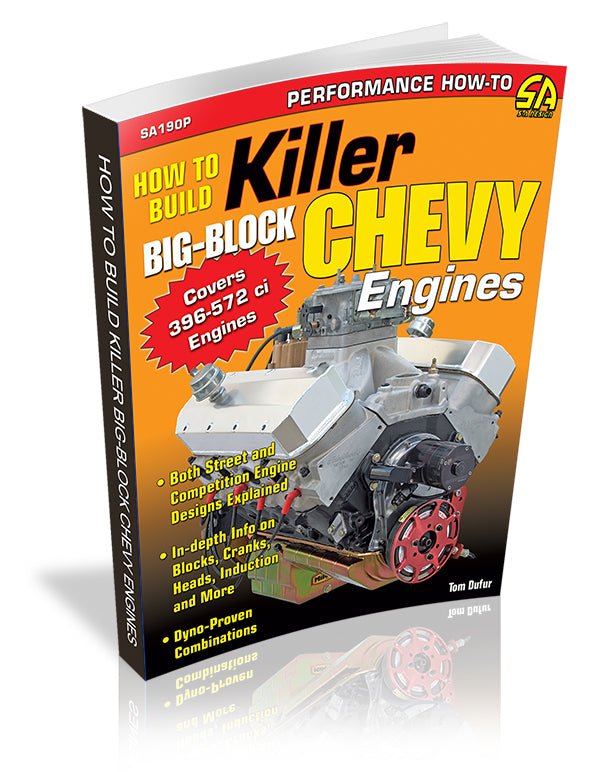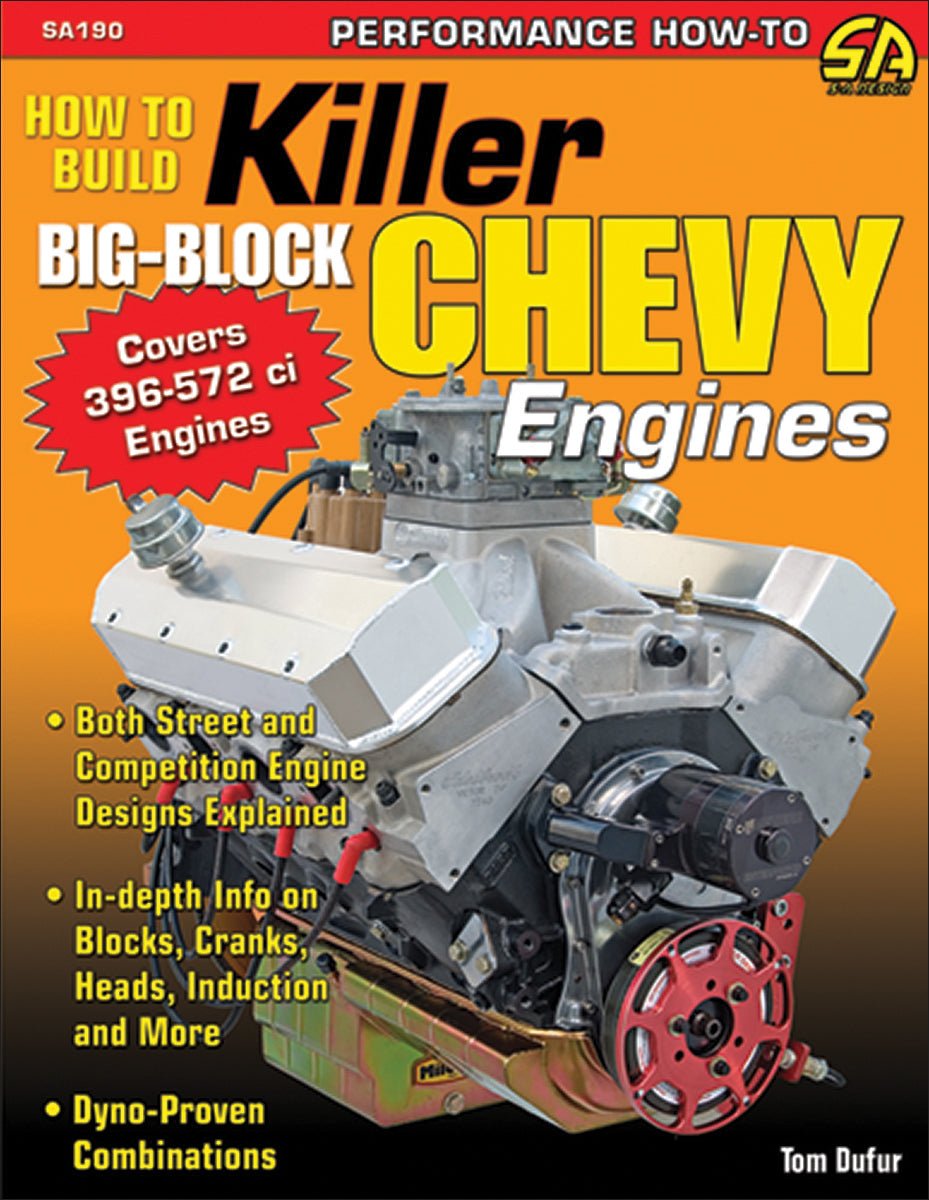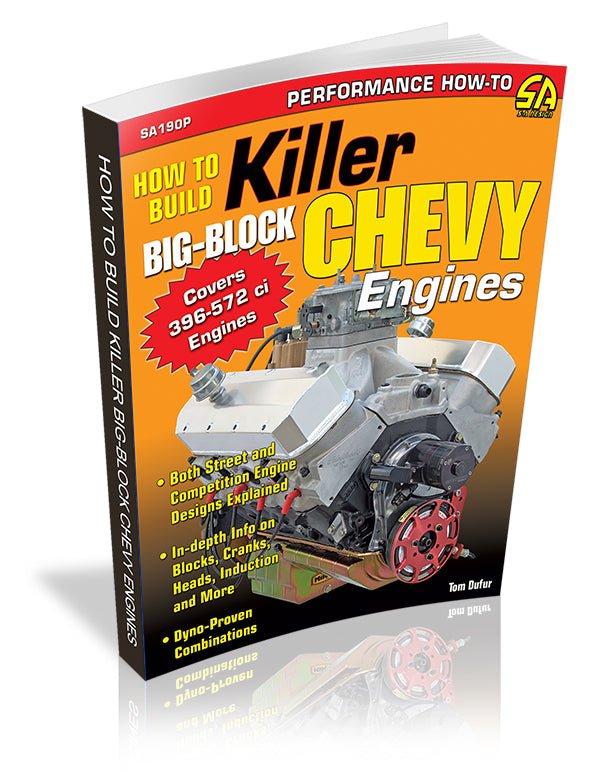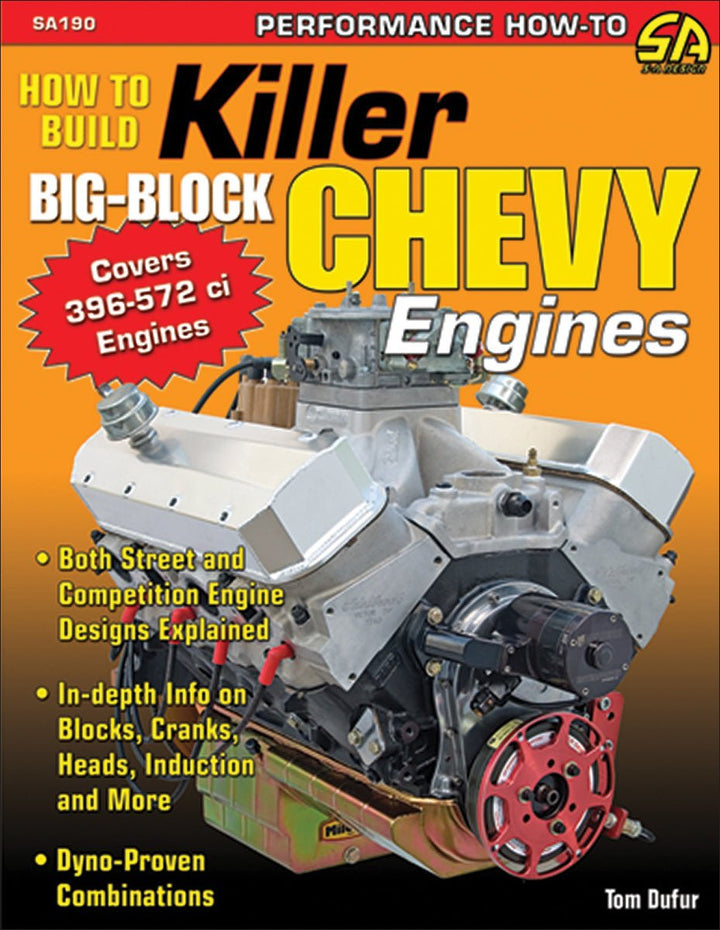Since its introduction in 1965, the big-block Chevy engine has been a force to be reckoned with on both the street and track. Over the past four decades, the big-block has undergone a constant evolution toward greater efficiency and durability. It's also picked up more displacement, as General Motors is now offering crate engines up to 572 ci, and aftermarket versions have gone much larger still.
In How to Build Killer Big-Block Chevy Engines, author Tom Dufur reviews the commonly available factory parts along with many aftermarket offerings, and discusses the advantages of both. Additionally, he includes popular buildup recipes and showcases the dyno results, proving theories and sharing in-depth research. Dufur's decades of experience designing, assembling, tuning, and racing the big-block Chevy engine truly shines through. A wealth of full-color photos, charts, and graphs makes it easy to understand the critical points of these great engines.
In-depth chapters on design, engine preparation, and assembly show you how to develop your own big-block Chevy to its full potential. Whether your big-block is destined for life in a street car, a race car, or even a boat, the wealth of information in this book will ensure it has ample power and longevity once it's all together.
Acknowledgments
About the Author
Chapter 1: Family Tree
396 Engines
402 Engines
427 Engines
454 Engines
General Motors Performance Parts Crate Engines
Chapter 2: Cylinder Blocks
Block Selection
Maximum Bore Sizes
Stock Blocks
Mark IV Blocks
Gen V and Gen VI Blocks
General Motors Performance Parts Blocks
Bowtie Blocks
GMPP Drag Race Competition Engine Blocks
Aftermarket Blocks
Block Casting Dates
Chapter 3: Crankshafts, Connecting Rods and Pistons
Crankshafts Project: Balancing the Reciprocating Assembly
Connecting Rods
Bearings
Pistons
Harmonic Dampeners
Flywheels and Flexplates
Starters
Chapter 4: Camshafts, Lifters and Valvetrain Components
Types of Camshafts and Lifters
Lift, Duration and Lobe Separation Angle
Project: How to Degree-In a Camshaft
General Camshaft Recommendations
OEM Cam Fitment
Lifters57Replacement Big-Block Camshafts
Oversized Cam Journals
Alternative Firing Orders: 4-7 Swap
Cam Drives: Chains, Gears and Belts
Pushrods
Rocker Arms
Valvesprings, Retainers and Keepers
Chapter 5: Oil and Lubrication Systems
Oil Pumps
Oil Pans
Oil Filters and Adapters
Pan Evacuation Systems and Vacuum Pumps
Accumulators, Coolers and Accessories
Motor Oil
Chapter 6: Cylinder Heads
Oval or Rectangular Intake Ports
Open or Closed Combustion Chambers
Mark IV, Gen V and Gen VI Heads
Aftermarket Cylinder Heads
Spread Port Heads
What’s Your (Valve) Angle?
Modifications
Aftermarket Cylinder Head Manufacturers
Chapter 7: Induction Systems
Intake Manifolds
Carburetor Spacers and Adapters
Tunnel Ram Intake Manifolds
Rochester Quadrajet Carburetors
Holley-Style Modular Carburetors
Carter/Weber/Edelbrock Square-Bore Carburetors
Air Cleaners
Fuel Pumps
Fuel Injection
Nitrous Oxide Injection
Superchargers
Turbochargers
Chapter 8: Exhaust Systems
OEM Exhaust Manifolds
Tubular Headers
Mufflers and Exhaust Pipes
An Exhausting Summary
Chapter 9: Ignition Systems
Distributors, Coils and Spark Plug Wires
Ignition Controllers
Spark Plugs
Batteries and Cables
Chapter 10: Cooling Systems
Water Pumps
Chapter 11: Gaskets and Fasteners
Cylinder Head Gaskets
Big-Block Engine Gaskets and Seals
Fasteners
Chapter 12: Engine Build-Up
Short-Block Assembly
Long-Block Assembly
Final Accessory Installation
Source Guide





